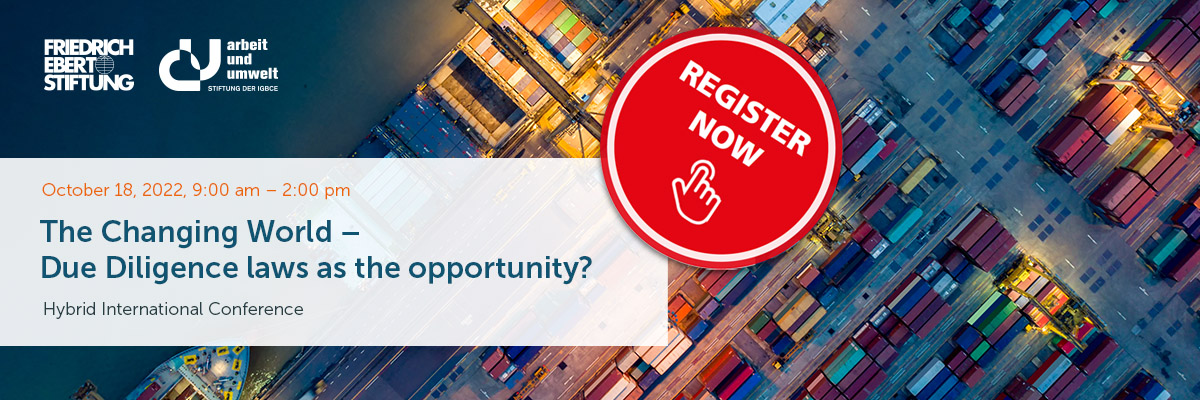
The Changing World – Due Diligence laws as the opportunity?

Hybrid International Conference
Invitation
The need to create sustainable supply chains is becoming an ever-more-frequent topic of political and social discourse. Global value creation needs to be more resilient to external disruptions and socially and ecologically sustainable. The ongoing Covid-19 pandemic and Russia’s illegal war against Ukraine are weighing heavily on the global economy. Disrupted supply chains, supply bottlenecks, raw material shortages, and increased commodity prices are just some of the consequences that pose major challenges for companies and employees.
Due diligence laws for multinational companies – which some countries already have – have the potential to make global value creation more resilient. Starting in 2023, the German »Supply
Chain Due Diligence Act« (LkSG) will oblige companies to preventively counteract human rights and environmental law violations along their supply chains.
A proposal of an EU Directive on Corporate Sustainability Due Diligence (CSDD) has been hotly debated since it was presented by the EU Commission in early 2022. The draft law is broader than
the German LkSG in many respects but falls short of expectations with regard to the UN Guiding Principles on Human Rights and Business. From a trade union’s perspective, adjustments are
a prerequisite for the bill’s final approval. Given its status as a leading economic power in the EU, Germany has been assigned a decisive role in shaping European law and the associated negotiations that will play out in the coming months.
Together with experts from politics, business, and civil society, we would like to discuss the following questions:
- What requirements arise from the LkSG and the EU Commission proposal? What are the strengths and weaknesses of statutory regulation? Where is there room for improvement
from a trade union perspective? How can these changes be introduced into the political process? - Are there examples of best practices for strengthening sustainable supply chains – at the national and international levels? What kind of obstacles are there, and how can they be
overcome? - What role does geopolitics play? What approaches, strategies, and measures should policymakers, businesses, trade unions, and other stakeholders take to strengthen sustainability
in global value chains?
We welcome your participation.
9.00 Uhr 9.20 Uhr 9.40 Uhr 10.00 Uhr 10.30 Uhr 10.45 Uhr 11.15 Uhr 12.00 Uhr 12.30 Uhr Moderator: Michael Windfuhr, Deputy Director, German Institute for Human Rights 14.00 Uhr Conference Moderators: Franziska Korn, Policy Advisor of Human Rights and Business, Global and European Politics, FES Berlin and Carola Dittmann, Head of CSR and participation, Foundation for Labour and Environment, IGBCE WELCOME
IMPULSE – THE CHALLENGE OF GLOBAL SUPPLY CHAINS: CORPORATE DUE DILIGENCE IN TIMES OF GEOPOLITICAL CRISIS
GLOBAL VALUE CHAINS UNDER PRESSURE: SUSTAINABLE SUPPLY CHAINS NEED CO-DETERMINATION
QUESTIONS FROM THE (VIRTUAL) AUDIENCE
BREAK
EUROPEAN SUPPLY CHAIN ACT: AMBITIONS AND IMPLEMENTATION
OPPORTUNITIES AND CHALLENGES IN CORPORATE DUE DILIGENCE FROM PRACTICE: EXAMPLES FROM DAY-TO-DAY BUSINESS OPERATIONS
BREAK
PANEL DISCUSSION: GLOBAL RESILIENCE
THROUGH HUMAN RIGHTS: ARE DUE DILIGENCE LAWS A GAME CHANGER?
Commerce (DIKH) (tbc)
SUMMARY & CLOSING
Anmeldung zur Veranstaltung
Buchungen sind für diese Veranstaltung nicht mehr möglich.

